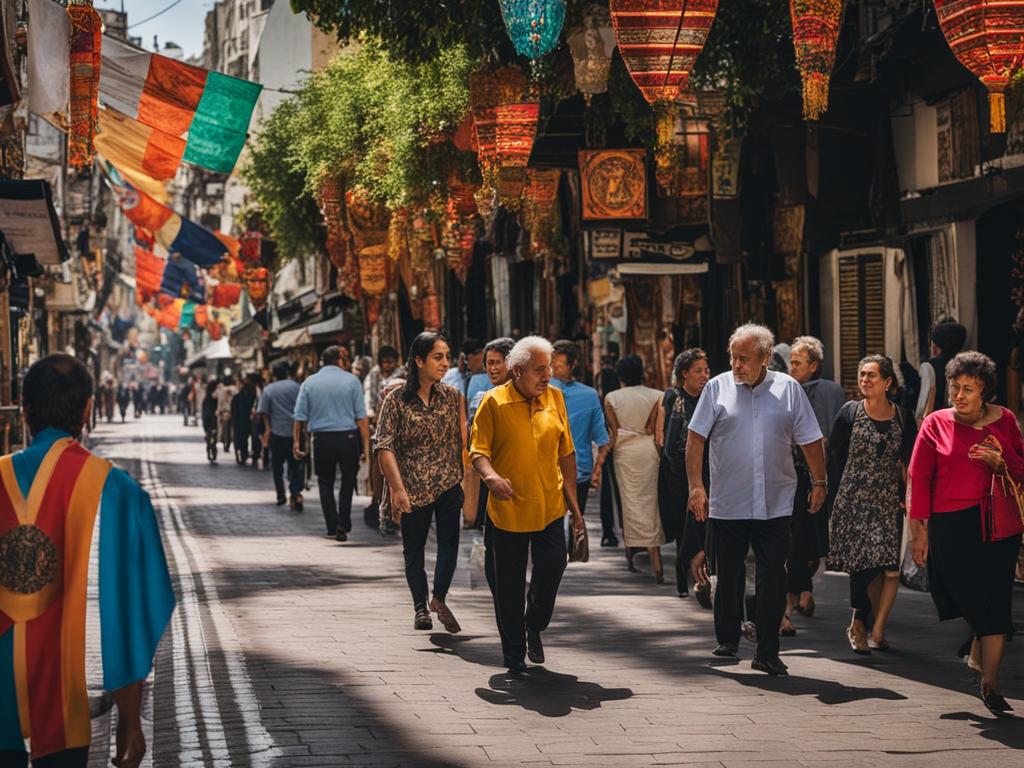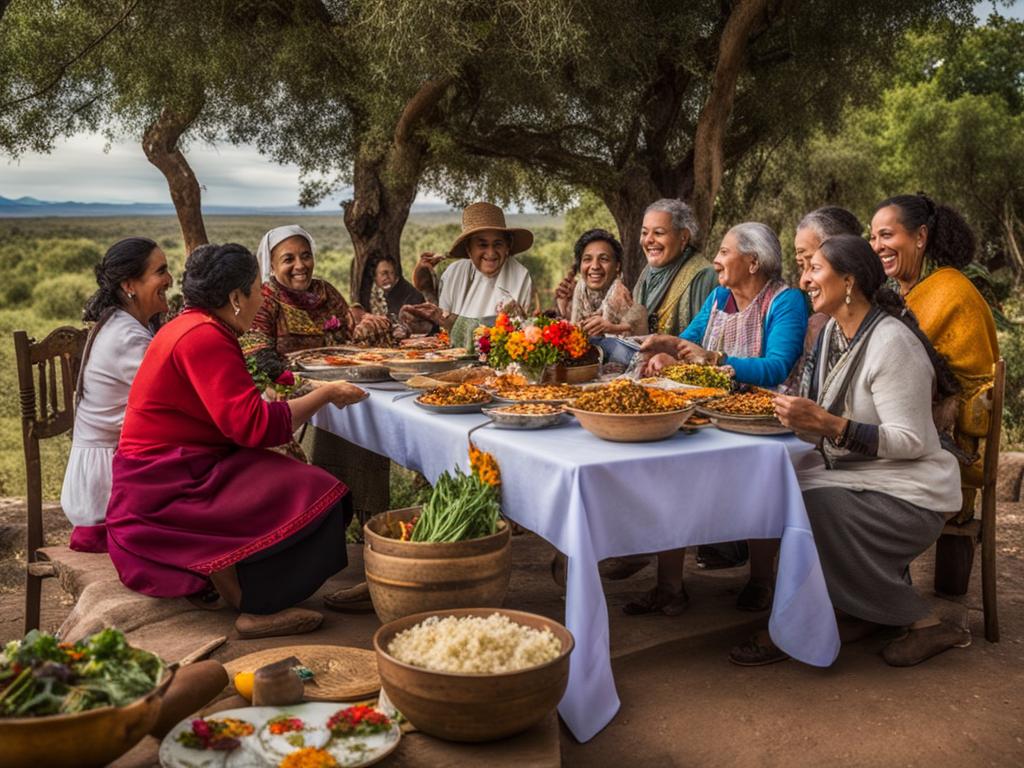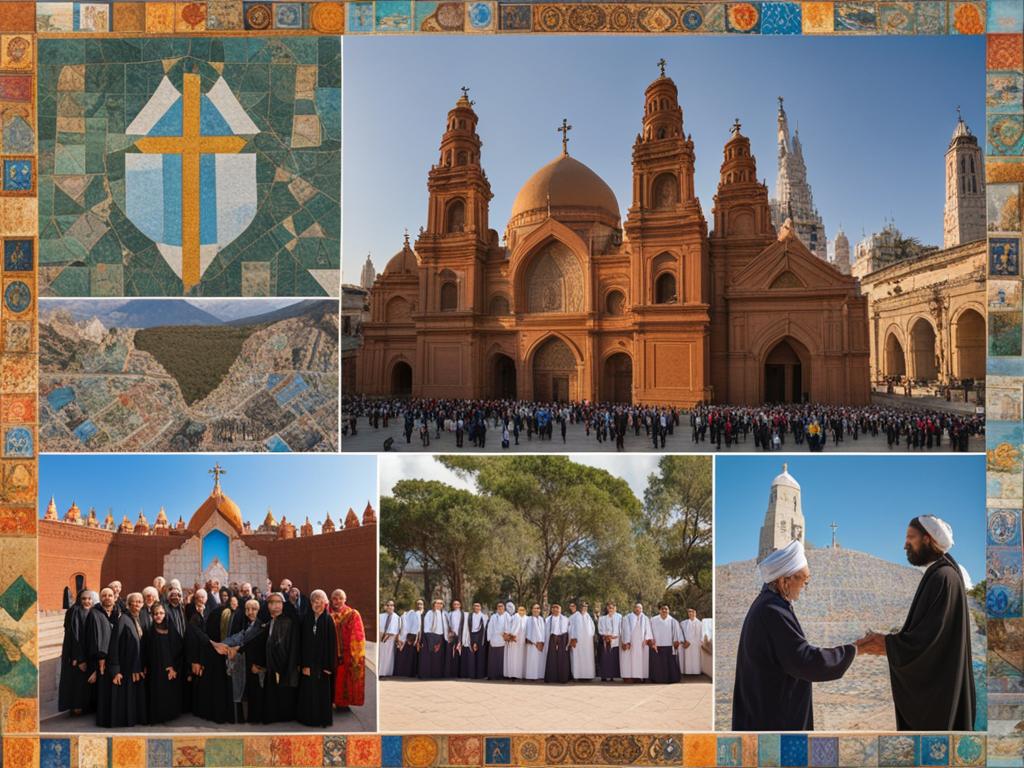Welcome to our comprehensive guide on the diverse religious landscape of Argentina. As a country shaped by European immigrants, particularly from Italy and Spain, Argentina’s religious fabric is a tapestry of various beliefs and practices. In this guide, we will delve into the major religions in Argentina, the religious demographics, the Argentine religious landscape, and the harmonious coexistence of different religious beliefs. Join us on this journey as we explore the spiritual practices, religious institutions, and the cherished value of religious freedom in Argentina.
Key Takeaways:
- Argentina has a diverse religious landscape, shaped by its history of European immigration.
- The dominant religion in Argentina is Roman Catholicism, but other major religions include Evangelical Christianity, Judaism, Islam, and indigenous religions.
- Argentina promotes religious freedom and values interfaith dialogue and tolerance.
- The coexistence of different religious beliefs and practices contributes to the cultural richness and spiritual diversity of Argentina.
Roman Catholicism
Roman Catholicism is the largest religion in Argentina, with the majority of the population identifying as Catholic. The Catholic Church has a strong presence in the country and plays a significant role in Argentinian culture.
Catholic traditions and practices are widely observed, including the celebration of religious holidays and sacraments. These traditions bring communities together and provide a sense of spiritual connection. The Catholic Church in Argentina also contributes to various charitable and social initiatives, supporting those in need and advocating for social justice.
Also read about: METROPOLITAN CATHEDRAL in Buenos Aires
Roman Catholicism in Argentina: A Brief Overview
To better understand the influence of Roman Catholicism in Argentina, let’s take a closer look at the Catholic population and the vibrant traditions they uphold:
| Key Aspect | Description |
|---|---|
| Catholic Population | The majority of Argentinians, approximately 74%, identify as Roman Catholics. |
| Catholic Church | The Catholic Church in Argentina is led by the Archbishop of Buenos Aires, who holds significant influence in both religious and social matters. |
| Sacraments | Argentinian Catholics partake in various sacraments, including baptism, confirmation, marriage, and the Holy Eucharist. |
| Religious Holidays | Events such as Easter, Christmas, and the Feast of the Immaculate Conception are widely celebrated throughout the country. |
| Devotional Practices | Prayer, personal devotions, and pilgrimages to holy sites are integral components of Catholic spiritual life in Argentina. |
Through their deep-rooted traditions and commitment to faith, Roman Catholics in Argentina contribute to the cultural fabric and spiritual vitality of the nation.
Evangelical Christianity in Argentina
Evangelical Christianity has experienced remarkable growth in Argentina in recent years, emerging as a significant religious presence alongside Roman Catholicism. The Evangelical population in Argentina has grown steadily, with many individuals converting to this faith due to its emphasis on personal faith and direct relationship with God.
Also read about: Emblematic Churches to Visit in Buenos Aires
Argentina’s Evangelical churches and ministries have become prominent throughout the country, attracting followers from diverse backgrounds. There are various denominations within Evangelical Christianity, each with its own unique beliefs and worship styles. This diversity contributes to the vibrant and evolving nature of Evangelical Christianity in Argentina.
Educational initiatives and community outreach programs are common within Evangelical churches, providing resources and support for their members. Additionally, evangelical leaders often play a key role in addressing social issues and advocating for change. Evangelical beliefs, such as the importance of personal salvation and social justice, resonate with many in Argentina’s population.
Evidence of Growth: Evangelical Population in Argentina
To further illustrate the growth of Evangelical Christianity in Argentina, the table below presents data on the Evangelical population in the country over the past decade:
| Year | Evangelical Population |
|---|---|
| 2010 | 5 million |
| 2012 | 6 million |
| 2014 | 7 million |
| 2016 | 8.5 million |
| 2018 | 10 million |
The table clearly demonstrates the steady growth of the Evangelical population in Argentina, highlighting the increasing influence and presence of Evangelical Christianity in the country.
Other Christian Denominations in Argentina
Argentina is not only home to Roman Catholicism and Evangelical Christianity but also hosts a variety of other Christian denominations. These denominations play a significant role in shaping the religious landscape of the country, offering diverse perspectives and practices that contribute to Argentina’s religious tapestry.
Protestant Churches
Protestantism has gained a notable following in Argentina, with various Protestant churches established throughout the country. Anglican, Methodist, Presbyterian, and Baptist churches are among the Protestant denominations present in Argentina. These churches have their unique beliefs, traditions, and practices, attracting followers who resonate with their teachings and worship styles.
Table: Other Christian Denominations in Argentina
| Denomination | Distinctive Features |
|---|---|
| Anglican Church | An English tradition with a liturgical worship style |
| Methodist Church | Emphasis on personal faith and social justice |
| Presbyterian Church | Reformed theology and elder-led governance |
| Baptist Church | Believer’s baptism and congregational autonomy |
Non-Catholic Christianity, represented by these Protestant denominations, offers an alternative spiritual path for those seeking a different religious experience than that offered by Roman Catholicism. The vibrant presence of these non-Catholic Christian denominations further enriches Argentina’s religious landscape and encourages religious diversity and dialogue.
Judaism
Judaism has a significant presence in Argentina, with one of the largest Jewish communities in Latin America. The Jewish population in Argentina is predominantly Ashkenazi and Sephardic, representing a rich tapestry of Jewish traditions and customs. Jewish traditions are deeply ingrained in Argentine culture and are celebrated throughout the country.
Argentina is home to numerous synagogues and Jewish organizations, providing a strong sense of community and religious support for Jewish individuals and families. These institutions play a vital role in fostering Jewish identity, promoting cultural heritage, and providing religious education and services.
The Jewish community in Argentina actively participates in the country’s social, cultural, and political life. They contribute to various fields, including art, literature, business, academia, and philanthropy. The Jewish population in Argentina continues to preserve their traditions and pass them down to future generations, ensuring the endurance of Jewish heritage in the country.


Islam in Argentina
Argentina is home to a small yet vibrant Muslim community, which has contributed to the country’s religious diversity. Islam is practiced by a diverse range of ethnicities, including Arabs, Turks, and South Asians, who have established mosques and Islamic centers throughout various cities in Argentina.
Also read about: Discover the Liberty Temple in Buenos Aires
The Muslim community in Argentina upholds Islamic traditions and customs, celebrating religious holidays such as Eid al-Fitr and Eid al-Adha. These festive occasions bring Muslims together to engage in communal prayer, share meals, and exchange gifts. Mosques serve as gathering places for worship and offer spiritual guidance to the Muslim population.
Islamic Organizations and Cultural Exchange
The Muslim community in Argentina is actively involved in promoting interfaith dialogue and cultural exchange. Islamic organizations work towards fostering understanding and cooperation among different religious communities, contributing to Argentina’s religious harmony.
| Islamic Organizations in Argentina | Activities |
|---|---|
| Islamic Cultural Center of Argentina (CIRA) | Organizes educational programs, lectures, and events to promote interfaith dialogue and understanding. |
| Islamic Organization for Latin America and the Caribbean (OIPALC) | Facilitates cultural exchange and cooperation among Islamic communities in the region. |
| Islamic Center of the Argentine Republic (CIRA) | Provides social services, support, and humanitarian assistance to both Muslims and non-Muslims. |
Through these initiatives, the Muslim community in Argentina contributes to the country’s cultural richness and promotes a message of peace, tolerance, and coexistence.
Indigenous Religions and Spiritual Practices
Indigenous religions in Argentina hold a significant place within the country’s cultural and spiritual fabric. These belief systems are deeply rooted in the ancestral traditions and natural surroundings of various indigenous communities. Indigenous spirituality in Argentina encompasses a wide range of practices, rituals, and ceremonies that are passed down through generations.
Traditional practices in Argentina’s indigenous religions often revolve around the worship and reverence of nature, spirits, and ancestors. Shamanism plays a vital role in these belief systems, with shamans acting as intermediaries between the human and spiritual realms. Sacred rituals and ceremonies are performed to maintain a harmonious relationship with the natural world and seek guidance from the spiritual forces believed to govern it.
Top Spanish school in Buenos Aires – your choice in Malaga, Buenos Aires, or the digital realm
Native Beliefs in Argentina
The native beliefs in Argentina are diverse and vary among different indigenous communities across the country. These native beliefs reflect the deep connection between spirituality, culture, and the land. Each group has its own unique set of traditions, mythologies, and spiritual practices that shape their worldview and understanding of the universe.
Through their native beliefs, indigenous communities in Argentina strive to preserve their cultural heritage and maintain their identity in a rapidly changing world. These belief systems offer a sense of belonging, guidance, and interconnectedness that have sustained these communities for centuries.
| Indigenous Religion | Region | Main Beliefs |
|---|---|---|
| Mapuche Religion | Patagonia and Central Argentina | Worship of Ngenechen (the supreme being), reverence for nature and ancestors |
| Guaraní Religion | Northern Argentina | Belief in Ñamandu (the creator of the universe), sacred rituals, and the concept of “mborayhu” |
| Wichi Religion | Chaco region | Connection with the natural world, belief in “Nuestro Padre Inti” (Father Sun) |


The preservation of indigenous religions and spiritual practices is essential for promoting cultural diversity and understanding in Argentina. These belief systems contribute to the vibrant tapestry of the country’s religious landscape and serve as a reminder of the rich heritage of its indigenous communities.
Interfaith Dialogue and Religious Freedom
Argentina is a country that values and promotes interfaith dialogue, religious tolerance, and the freedom of religion. With its diverse religious landscape, the country encourages cooperation and understanding among different religious communities, fostering an environment of religious coexistence.
Interfaith dialogue plays a crucial role in Argentina, allowing people of different faiths to come together, exchange perspectives, and build bridges of understanding. This dialogue helps to break down barriers, challenge prejudices, and promote acceptance. By engaging in open and respectful conversations, individuals from various religious backgrounds can learn from one another and find common ground, contributing to a more harmonious society.
Religious tolerance is a fundamental principle in Argentina, with the recognition that everyone has the right to practice their faith freely and without discrimination. The country’s commitment to religious freedom extends to protecting the rights of individuals to choose their beliefs, worship, and participate in religious activities of their choosing.
Also read about: Exploring the Indigenous Languages of Argentina: A Deep Dive
Argentina’s dedication to interfaith dialogue and religious freedom is also reflected in the numerous initiatives and organizations dedicated to promoting these values. These entities provide platforms for dialogue, organize events and interfaith activities, and work towards creating an inclusive society for all religious communities.


In summary, Argentina’s commitment to interfaith dialogue and religious freedom fosters an environment of religious tolerance, coexistence, and understanding. Through dialogue and respect, individuals from different religious backgrounds can form connections, promote acceptance, and contribute to a harmonious society. The country’s dedication to these principles is evident through various initiatives and organizations that strive to cultivate interfaith dialogue and ensure the freedom to practice religion without discrimination.
Conclusion
Argentina’s religious landscape is a reflection of its multicultural heritage, with a diverse range of beliefs and practices. While Roman Catholicism remains the dominant religion, there is a significant presence of Evangelical Christianity, Judaism, Islam, and indigenous religions. This religious diversity contributes to the cultural richness and spiritual tapestry of Argentina.
The country’s commitment to religious freedom and interfaith dialogue is commendable. Argentina values the coexistence of different religious beliefs and actively promotes tolerance and understanding among its diverse religious communities. This commitment to religious harmony sets an example for other nations seeking to foster peaceful coexistence among different faiths.
In conclusion, Argentina’s religious landscape is a testament to the country’s inclusive and accepting nature. The harmonious coexistence of various religions is not only a reflection of Argentina’s multicultural heritage but also a source of cultural enrichment and spiritual diversity. The continued promotion of religious freedom and interfaith dialogue will ensure that Argentina remains a shining example of tolerance and respect for religious differences.




